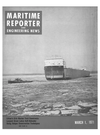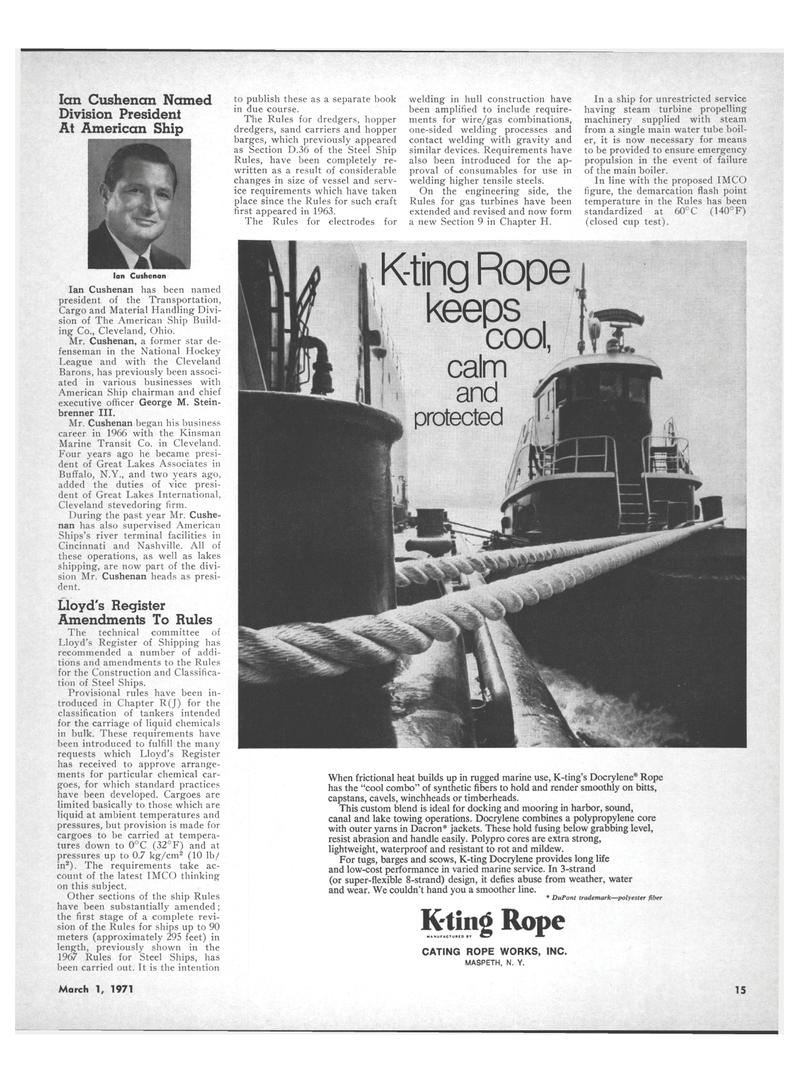
Page 13: of Maritime Reporter Magazine (March 1971)
Read this page in Pdf, Flash or Html5 edition of March 1971 Maritime Reporter Magazine
Ian Cushenan Named
Division President
At American Ship
Ian Cushenan
Ian Cushenan has been named president of the Transportation,
Cargo and Material Handling Divi- sion of The American Ship Build- ing Co., Cleveland, Ohio.
Mr. Cushenan, a former star de- fenseman in the National Hockey
League and with the Cleveland
Barons, has previously been associ- ated in various businesses with
American Ship chairman and chief executive officer George M. Stein- brenner III.
Mr. Cushenan began his business career in 1966 with the Kinsman
Marine Transit Co. in Cleveland.
Four years ago he became presi- dent of Great Lakes Associates in
Buffalo, N.Y., and two years ago, added the duties of vice presi- dent of Great Lakes International,
Cleveland stevedoring firm.
During the past year Mr. Cushe- nan has also supervised American
Ships's river terminal facilities in
Cincinnati and Nashville. All of these operations, as well as lakes shipping, are now part of the divi- sion Mr. Cushenan heads as presi- dent.
Lloyd's Register
Amendments To Rules
The technical committee of
Lloyd's Register of Shipping has recommended a number of addi- tions and amendments to the Rules for the Construction and Classifica- tion of Steel Ships.
Provisional rules have been in- troduced in Chapter R(J) for the classification of tankers intended for the carriage of liquid chemicals in bulk. These requirements have been introduced to fulfill the many requests which Lloyd's Register has received to approve arrange- ments for particular chemical car- goes, for which standard practices have been developed. Cargoes are limited basically to those which are liquid at ambient temperatures and pressures, but provision is made for cargoes to be carried at tempera- tures down to 0°C (32°F) and at pressures up to 0.7 kg/cm2 (10 lb/ in2). The requirements take ac- count of the latest IMCO thinking on this subject.
Other sections of the ship Rules have been substantially amended; the first stage of a complete revi- sion of the Rules for ships up to 90 meters (approximately 295 feet) in length, previously shown in the 1967 Rules for Steel Ships, has been carried out. It is the intention to publish these as a separate book in due course.
The Rules for dredgers, hopper dredgers, sand carriers and hopper barges, which previously appeared as Section D.36 of the Steel Ship
Rules, have been completely re- written as a result of considerable changes in size of vessel and serv- ice requirements which have taken place since the Rules for such craft first appeared in 1963.
The Rules for electrodes for welding in hull construction have been amplified to include require- ments for wire/gas combinations, one-sided welding processes and contact welding with gravity and similar devices. Requirements have also been introduced for the ap- proval of consumables for use in welding higher tensile steels.
On the engineering side, the
Rules for gas turbines have been extended and revised and now form a new Section 9 in Chapter H.
In a ship for unrestricted service having steam turbine propelling machinery supplied with steam from a single main water tube boil- er, it is now necessary for means to be provided to ensure emergency propulsion in the event of failure of the main boiler.
In line with the proposed IMCO figure, the demarcation flash point temperature in the Rules has been standardized at 60°C (140°F) (closed cup test).
When frictional heat builds up in rugged marine use, K-ting's Docrylene® Rope has the "cool combo" of synthetic fibers to hold and render smoothly on bitts, capstans, cavels, winchheads or timberheads.
This custom blend is ideal for docking and mooring in harbor, sound, canal and lake towing operations. Docrylene combines a polypropylene core with outer yarns in Dacron* jackets. These hold fusing below grabbing level, resist abrasion and handle easily. Polypro cores are extra strong, lightweight, waterproof and resistant to rot and mildew.
For tugs, barges and scows, K-ting Docrylene provides long life and low-cost performance in varied marine service. In 3-strand (or super-flexible 8-strand) design, it defies abuse from weather, water and wear. We couldn't hand you a smoother line. • DuPont trademark—polyester fiber
UFACTUMCO «
CATING ROPE WORKS, INC.
MASPETH, N. Y.
March 1, 1971 15

 12
12

 14
14
